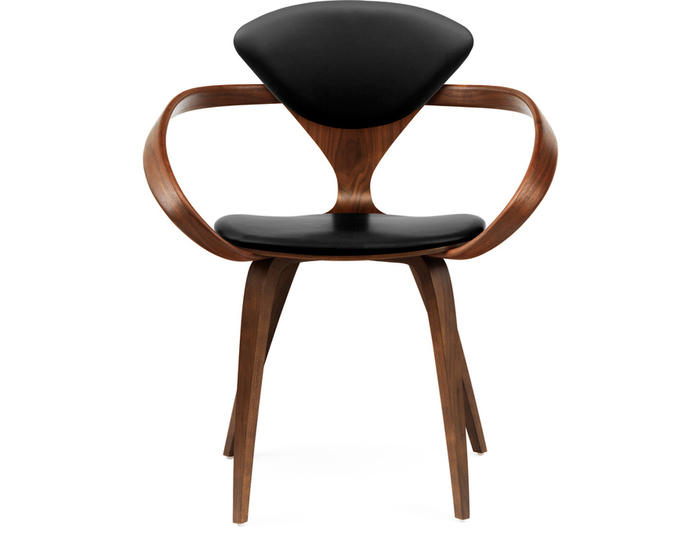cherner arm chair with upholstered seat & back
by Norman Cherner from Cherner - sale
cherner arm chair with upholstered seat & back
Design Norman Cherner, 1958
Molded plywood, solid beech arms, upholstery
Made in the USA by The Cherner Chair Company
The Cherner family is proud to realize the reintroduction of the famed "Cherner Chair". Designed by Norman Cherner for Plycraft in 1958, this chair is found in design collections throughout the world, including the Vitra Design Museum. The Cherner Chair is still regarded as one of the most dramatic designs utilizing the technology of molding plywood. Like the 1958 original, the Cherner armchair utilizes a molded plywood seat with a unique construction of laminated plywood in graduated thickness. The graceful and sweeping arms are made of solid beech which gives the chair additional strength and beauty. Each chair is manufactured from the original drawings, molds and specifications by Cherner Chair, a Cherner family company headed by the designer's sons.
Cherner chairs and stools are available with upholstered seat pads. The seat pads are separate molded plywood shells padded with 3/4" of foam wrapped with fabric or leather options. The Upholstered pads are fabricated according Norman Cherner's original drawings and specifications. Chairs and stools can be ordered with a seat and back pad or the seat pad only.
The "classic stained walnut" option have a stain applied to both the beech core and the walnut face veneer which gives the product a uniform walnut color (very little contrast in color between the beech core and the walnut veneer). The "natural clear stained walnut" option have only a clear finish applied, which emphasizes the contrast between the exposed beech core and walnut face veneer.
26.5" w | 21.5" d | 31.5" h | seat: 18" h | arms: 26" h
Molded plywood, solid beech arms, upholstery
Made in the USA by The Cherner Chair Company
The Cherner family is proud to realize the reintroduction of the famed "Cherner Chair". Designed by Norman Cherner for Plycraft in 1958, this chair is found in design collections throughout the world, including the Vitra Design Museum. The Cherner Chair is still regarded as one of the most dramatic designs utilizing the technology of molding plywood. Like the 1958 original, the Cherner armchair utilizes a molded plywood seat with a unique construction of laminated plywood in graduated thickness. The graceful and sweeping arms are made of solid beech which gives the chair additional strength and beauty. Each chair is manufactured from the original drawings, molds and specifications by Cherner Chair, a Cherner family company headed by the designer's sons.
Cherner chairs and stools are available with upholstered seat pads. The seat pads are separate molded plywood shells padded with 3/4" of foam wrapped with fabric or leather options. The Upholstered pads are fabricated according Norman Cherner's original drawings and specifications. Chairs and stools can be ordered with a seat and back pad or the seat pad only.
The "classic stained walnut" option have a stain applied to both the beech core and the walnut face veneer which gives the product a uniform walnut color (very little contrast in color between the beech core and the walnut veneer). The "natural clear stained walnut" option have only a clear finish applied, which emphasizes the contrast between the exposed beech core and walnut face veneer.
26.5" w | 21.5" d | 31.5" h | seat: 18" h | arms: 26" h
related products
average rating: 5
Norman Cherner
Considered a pioneer in molded plywood, Norman Cherner used this method to create a line of seating for Plycraft that led to his famous Cherner Chair. Plycraft produced this chair after telling Norman that his plans had been scrapped and took credit for his design. The chair became famous after it was depicted by Norman Rockwell in the painting "The Artist At Work."
Cherner's environmental philosophy is that you will never find a Cherner Chair product in a landfill. Cherner designs are cherished and handed down to future generations.






 write a review now
write a review now
